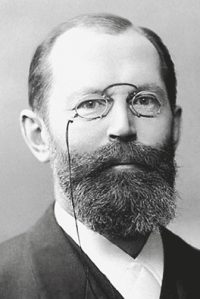Peptides were discovered in the early XX century by the German chemist Hermann Emil Fischer. In 1900, he put forward the hypothesis that the peptides consist of chains of amino acids formed by certain bonds. Already in 1902 he obtained irrefutable proof of the existence of peptide bonds, in 1905 he invented a method of a peptide synthesis in the laboratory.
This discovery marked the beginning of peptide studies. Scientists started studying the structure of various compounds developing methods for the splitting of polymeric compounds into monomers, synthesizing more and more peptides.
For little more than 70 years of studying peptides, mankind had been going through a phase of quantitative accumulation of knowledge, but 30 years ago quantity was transformed into quality, a breakthrough took place: the unique action of short peptides was revealed to the world.

In the 70s, the students of a famous German doctor managed to “preserve” embryonic cells.
The experiments of Dr. Otto Warburg, a Nobel laureate in the field of Biology, proved that cell cultures which underwent such treatment retained their basic properties.
After that the world’s first cellular cosmetics appeared which later grew into the extensive and promising area of dermal reductants.



Professor Jean Martinez is a leading scientist in the field of Pharmacology and Biology of Peptides as well as Medical Chemistry.
Professor Martinez is internationally recognized for his highly regarded work in the field of Methodology of Organic Synthesis and Peptide Synthesis 21 as well as the development and synthesis of various selective neuropeptides and biomaterial containing biomolecules with strong effects.



Vladimir H. Khavinson — Honoured scientist of the Russian Federation, Doctor of Theoretical Medicine, Professor, Member of the Russian Academy of Medical Sciences, Director of the Institute for Bioregulation and Gerontology in Sankt Petersburg (the Russian Academy of Medical Sciences, Department Northwest), Vice President of the Gerontology Association of the Russian Academy of Sciences, President of the European Association for Gerontology and Geriatrics, Colonel of the Medical Services, ret.
Professor Khavinson is internationally recognized for his research results in Biochemistry, Gerontology and Immunology. His work in these fields allowed for the development of the concept for the regulation of peptides causing ageing, finding new application possibilities for peptide bioregulators to retard ageing processes, prolonging life and increasing the quality of life, correcting the work of all body systems. Professor Khavinson’s innovative elaboration in the field of synthesis research and the further use of short peptides are revolutionary.


Since the end of the last century, peptides have been widely used in sports, replacing hormones. For an athlete to gain strength, endurance and rapid recovery, training and proper nutrition are not sufficient. He/she definitely needed pharmacological agents providing the selective effect of a range of hormones, yet not violating the general hormonal background.
Optimal and safe substitutes for wide-spread hormonal drugs were peptides, the main properties of which include activation of the growth hormone, stimulation of the increased lean muscle mass, increase in the metabolism rate, fat burning, a shorter recovery period of the body, strengthened bones and cartilage and enhanced immunity.
Widespread and popular today, synthetic peptide drugs require individual selection and a certain dosage, they are difficult to use because they are injectable medications, they require special storage conditions and careful use only under the supervision of specialists.
When taking such medication, it is necessary to closely study the description of peptides, carefully select dosage, number of in-takes, know the precise time of action and calculate the working intervals of dosages — a full course shall be undergone. The combination of the peptides with each other is crucial. All these difficulties make an administration of injectable peptides not feasible for the majority of people doing different sports.

The essential difference of peptide complexes developed by Ideal Pharma GmbH is the simplicity and availability of the peptide application, they are embedded in the usual products for sports (BCAAs, Arginine, Glutamine, Carnitine, Creatine, Taurine, etc.) at the molecular level, these products are used by every, not even a professional, athlete.
For the body to receive peptides today it is not necessary to take additional separate capsules or tablets, and injections are no longer required. Standard storage conditions allow not to worry about the shelf life. Correctly matched peptides are combined into peptide complexes, having a pronounced activity of a directed effect.

Science is going from discoveries to practice in leaps and bounds: Just over a hundred years have passed since the discovery of peptides, and we have them on our table, in our home and life.
In the near future we will see the emergence of the peptide complexes on the labels of the products we usually buy at the supermarket.
Today we are not surprised by vitaminized milk or bread with vitamins, rich in minerals and trace elements, breakfast cereals or sunflower oil, etc.
We see vitamin and mineral mixtures in virtually every product in our home, and the situation with peptides is the same — they are already part of our usual diet.
